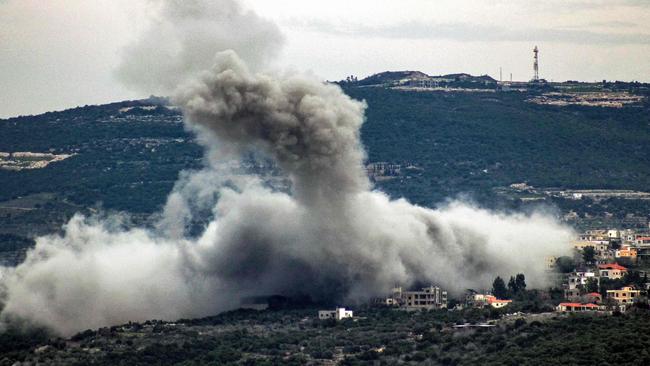Israel launches deadly strikes in Lebanon as border conflict widens
Israel’s military and militants in Lebanon exchange deadly fire in a widening round of tit-for-tat strikes as ceasefire talks with Hamas hit a setback.

Israel’s military and militants in Lebanon have exchanged deadly fire in a widening round of tit-for-tat strikes, as ceasefire talks with Hamas hit a new setback when Israel said it wouldn’t send a delegation to Cairo to continue negotiations.
Israel launched extensive strikes on targets deep inside Lebanon on Wednesday (Thursday AEDT) after militant fire hit an Israeli military base and a nearby city, killing a female soldier and injuring another soldier plus seven civilians.
The Israeli strikes killed at least five, including two Hezbollah fighters, the militant group said. Two children and their mother were also killed in the Lebanese village of Souaneh, Lebanon’s state-controlled news agency said.
Both sides have accused the other of increasing the scope of strikes in recent weeks, threatening to undermine months-long negotiations to defuse tensions at the border at a time Israel is planning to expand its offensive inside Gaza to target Hamas units in Rafah, a southern border city where more than one million people – half the population of the Gaza Strip – have taken shelter.
Two of the militants’ rockets struck inside the Israeli city of Safed, 12km from the border and beyond the emergency evacuation zone Israel has established to protect civilians from the growing violence. More than 100,000 Israelis living along the Lebanese border have been displaced since Hezbollah launched a series of cross-border strikes after the October 7 Hamas attack on southern Israel.
Hezbollah has been the main group involved in the exchanges with Israel, although it hasn’t yet taken responsibility for Wednesday’s strikes. Militants in Lebanon have periodically targeted Safed, but Israel’s Iron Dome missile-defence system have usually intercepted the rockets.
Israel said it shot back at the sources of fire and followed up with airstrikes on strategic targets such as Hezbollah military compounds, operational control rooms and infrastructure. Several of the targets belonged to Hezbollah’s elite Radwan commando forces.
The US has worked to bring an end to the destabilising strikes on the Israel-Lebanon border, and Washington’s special envoy, Amos Hochstein, was in Israel earlier this month to draw up a plan. Earlier this month, Secretary of Defence Lloyd Austin spoke to Israeli Minister of Defence Yoav Gallant, emphasising the US’s support for a diplomatic resolution to the conflict.
Hezbollah, part of an Iran-backed array of militant groups that also includes Hamas, says it won’t consider a peace plan until Israel ends its invasion of Gaza. With its residents squeezed by Hezbollah fire, Israel has vowed to launch an all-out war on Hezbollah if a diplomatic solution to secure the border can’t be reached.
US diplomatic efforts to bring about a halt to the fighting in Gaza and free hostages held by Hamas also are struggling to make headway. A day after talks involving negotiators from the US, Israel, Egypt and Qatar failed to close any of the major gaps between Israel and Hamas, the Israeli Prime Minister’s Office said the government wouldn’t send a delegation back to Cairo to continue negotiations.
“Prime Minister Benjamin Netanyahu insists that Israel will not give in to Hamas’s delusional demands,” his office said in a statement. Israel would resume talks if Hamas softened its stance, the statement said.
CIA director William Burns, David Barnea, the head of Israel’s Mossad intelligence agency, as well as Egyptian intelligence chief Abbas Kamel and Qatari Prime Minister Sheik Mohammed bin Abdulrahman al-Thani, all gathered in the Egyptian capital on Tuesday for the talks. A team of Israeli security officials led by Mr Barnea left Cairo on Tuesday evening.
Israel has resisted Hamas’s demands for a permanent ceasefire and a complete withdrawal of its military from Gaza, according to officials familiar with the talks. The two sides are also far apart on the ratio of Palestinian prisoners to be released for each hostage.
“There is a consensus in the war cabinet and among the security chiefs that Hamas’s proposal is a nonstarter,” said a person familiar with the Israeli position.
The Wall Street Journal


